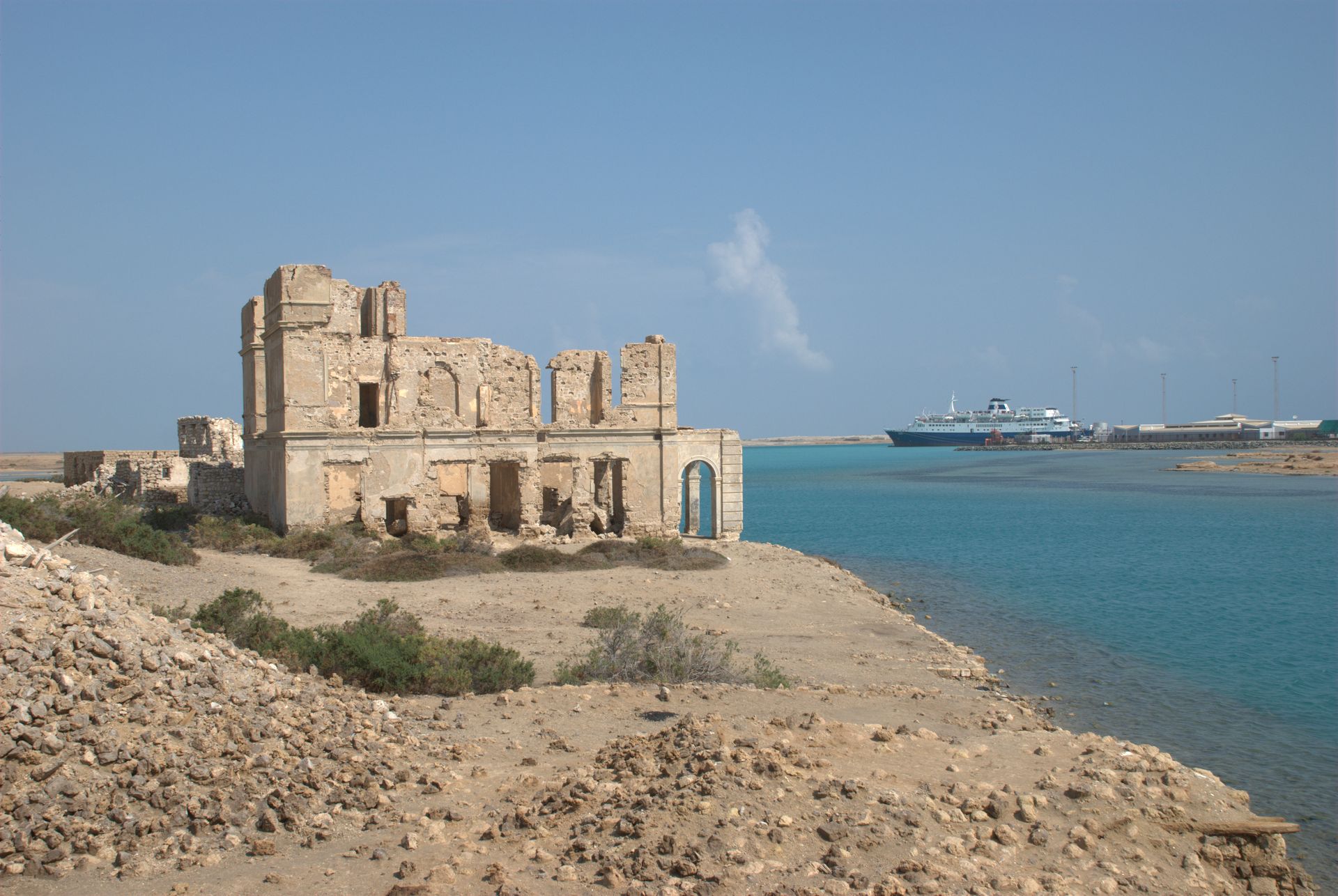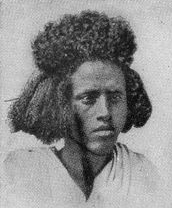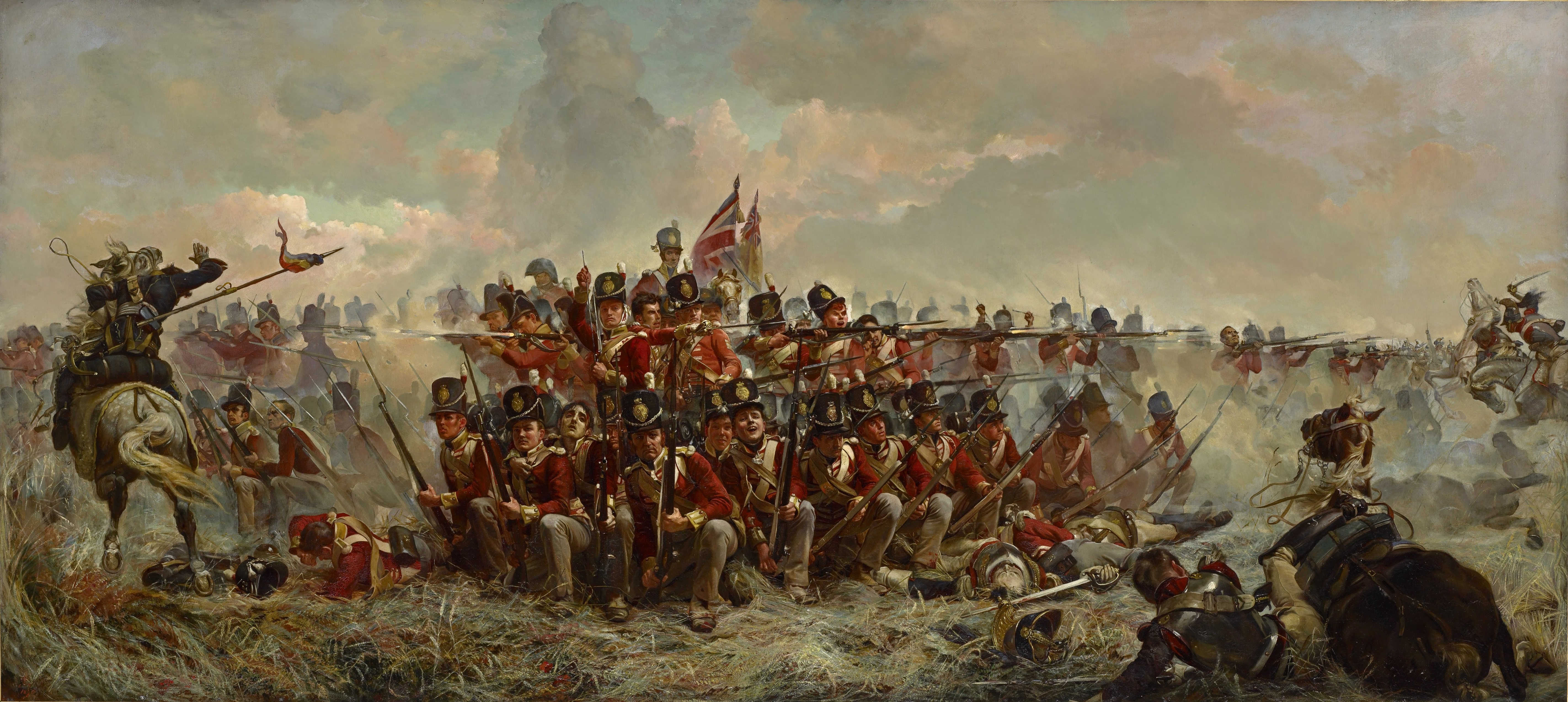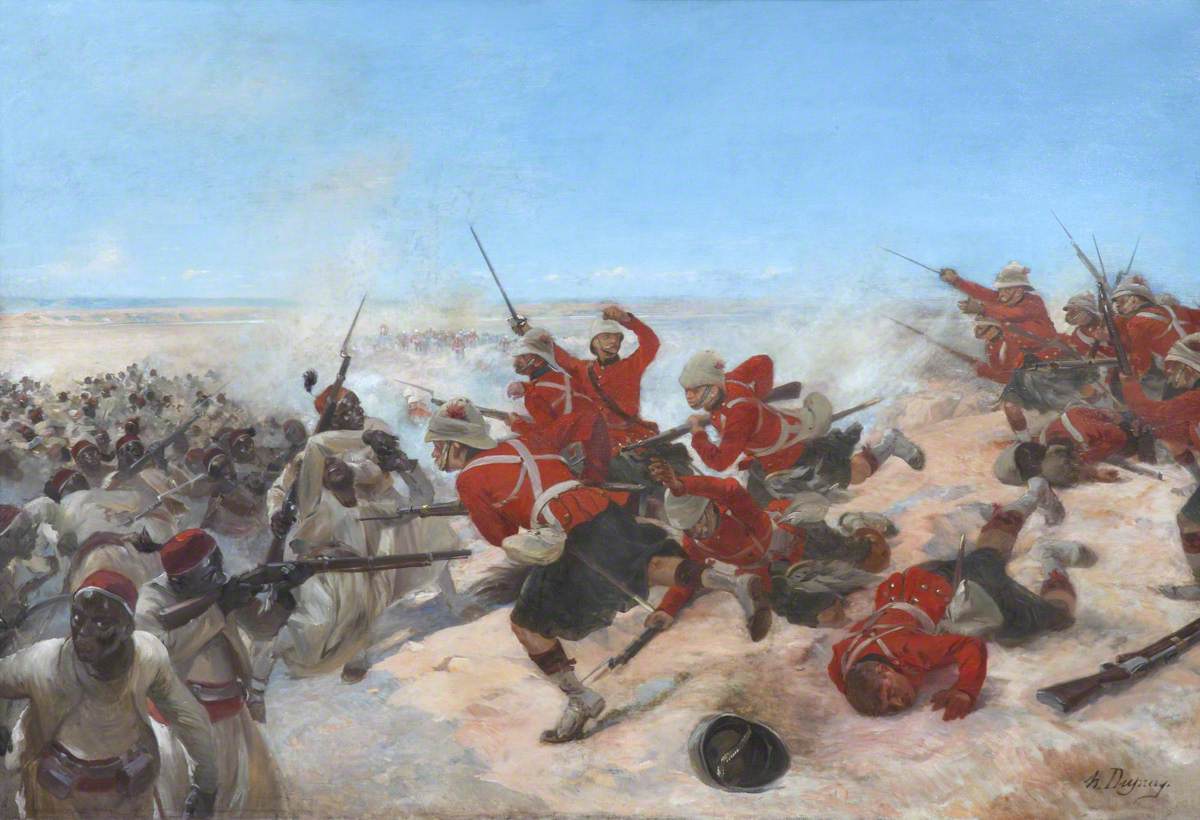|
Osman Digna
Osman Digna ( ar, عثمان دقنة) (c.1840 – 1926) was a follower of Muhammad Ahmad, the self-proclaimed Mahdi, in Sudan, who became his best known military commander during the Mahdist War. He was claimed to be a descendant from the Abbasid family. As the Mahdi's ablest general, he played an important role in the fate of General Charles George Gordon and the loss of the Sudan to Turkish-Egyptian rule. In Britain, Osman Digna became a notorious figure, both demonised as a savage and respected as a warrior. Winston Churchill described him as an "astute" and "prudent" man, calling him "the celebrated, and perhaps immortal, Osman Digna." Mahdist leader Osman Digna's father was a Kurd and his mother hailed from the Hadendoa tribe of the Beja people. His birthplace is not documented, but Suakin was said to be the town, where he was born. He was originally known as Osman Ali. He lived in Alexandria, Egypt, where he dealt in the selling of slaves. After the English forced him ... [...More Info...] [...Related Items...] OR: [Wikipedia] [Google] [Baidu] |
Suakin
Suakin or Sawakin ( ar, سواكن, Sawákin, Beja: ''Oosook'') is a port city in northeastern Sudan, on the west coast of the Red Sea. It was formerly the region's chief port, but is now secondary to Port Sudan, about north. Suakin used to be considered the height of medieval luxury on the Red Sea, but the old city built of coral is now in ruins. In 1983, the adjacent historic mainland town, known as the Geyf, had a population of 18,030 and the 2009 estimate is 43,337. Ferries run daily from Suakin to Jeddah in Saudi Arabia. Etymology The Beja name for Suakin is Oosook. This is possibly from the Arabic word ''suq'', meaning market. In Beja, the locative case for this is ''isukib'', whence Suakin might have derived.Berg, RobertSuakin: Time and Tide. ''Saudi Aramco World.'' The spelling on Admiralty charts in the late 19th century was "Sauakin", but in the popular press "Suakim" was predominant. History Ancient Suakin was likely Ptolemy's Port of Good Hope, Limen Evangelis, ... [...More Info...] [...Related Items...] OR: [Wikipedia] [Google] [Baidu] |
Beja People
The Beja people ( ar, البجا, Beja: Oobja, tig, በጃ) are an ethnic group native to the Eastern Desert, inhabiting a coastal area from southeastern Egypt through eastern Sudan and into northwestern Eritrea. They are descended from peoples who have inhabited the area since 4000 BC or earlier, although they were Arabized by Arabs who settled in the region. They are nomadic, and live primarily in the Eastern Desert. They number around 1,900,000 to 2,200,000 people. Most of the Beja speak Arabic, while some speak the Cushitic language of Beja and the Semitic language of Tigre. In Eritrea and southeastern Sudan, many members of the Beni-Amer grouping speak Tigre. Originally, the Beja did not speak Arabic, however the migration of the numerous Arab tribes of Juhaynah, Mudar, Rabi'a, and many more to the Beja areas contributed to the Arabization and Islamization of them, however the Arabs did not fully settle in the Beja areas as they looked for better climate in other ar ... [...More Info...] [...Related Items...] OR: [Wikipedia] [Google] [Baidu] |
The Battle Of El-Teb
''The'' () is a grammatical article in English, denoting persons or things already mentioned, under discussion, implied or otherwise presumed familiar to listeners, readers, or speakers. It is the definite article in English. ''The'' is the most frequently used word in the English language; studies and analyses of texts have found it to account for seven percent of all printed English-language words. It is derived from gendered articles in Old English which combined in Middle English and now has a single form used with pronouns of any gender. The word can be used with both singular and plural nouns, and with a noun that starts with any letter. This is different from many other languages, which have different forms of the definite article for different genders or numbers. Pronunciation In most dialects, "the" is pronounced as (with the voiced dental fricative followed by a schwa) when followed by a consonant sound, and as (homophone of pronoun ''thee'') when followed by a v ... [...More Info...] [...Related Items...] OR: [Wikipedia] [Google] [Baidu] |
Fuzzy-Wuzzy
"Fuzzy-Wuzzy" is a poem by the English author and poet Rudyard Kipling, published in 1892 as part of '' Barrack Room Ballads''. It describes the respect of the ordinary British soldier for the bravery of the Hadendoa warriors who fought the British army in the Sudan and Eritrea. Background "Fuzzy-Wuzzy" was the term used by British soldiers for Beja warriors who were supporting the Mahdi of Sudan in the Mahdist War. The term relates to the elaborate ''tiffa'' hair style favoured by the Hadendoa tribe, a subdivision of the Beja people. The Beja people were one of several broad multi-tribal groupings supporting the Mahdi, and were divided into six tribes: Hadendoa, Halanga, Amarar, Beni-Amer, Habab, and Bishariyyin. All of these are semi-nomadic and inhabit the Sudan's Red Sea Hills, Libyan Desert, and southern Egypt. The Beja provided a large number of warriors to the Mahdist forces. They were armed with swords and spears and some of them carried breech-loaded rifles whi ... [...More Info...] [...Related Items...] OR: [Wikipedia] [Google] [Baidu] |
Rudyard Kipling
Joseph Rudyard Kipling ( ; 30 December 1865 – 18 January 1936)''The Times'', (London) 18 January 1936, p. 12. was an English novelist, short-story writer, poet, and journalist. He was born in British India, which inspired much of his work. Kipling's works of fiction include the ''Jungle Book'' duology ('' The Jungle Book'', 1894; '' The Second Jungle Book'', 1895), ''Kim'' (1901), the '' Just So Stories'' (1902) and many short stories, including "The Man Who Would Be King" (1888). His poems include " Mandalay" (1890), " Gunga Din" (1890), "The Gods of the Copybook Headings" (1919), " The White Man's Burden" (1899), and "If—" (1910). He is seen as an innovator in the art of the short story.Rutherford, Andrew (1987). General Preface to the Editions of Rudyard Kipling, in "Puck of Pook's Hill and Rewards and Fairies", by Rudyard Kipling. Oxford University Press. His children's books are classics; one critic noted "a versatile and luminous narrative gift".Rutherford, Andrew ( ... [...More Info...] [...Related Items...] OR: [Wikipedia] [Google] [Baidu] |
Infantry Square
An infantry square, also known as a hollow square, was a historic combat formation in which an infantry unit formed in close order, usually when it was threatened with cavalry attack. As a traditional infantry unit generally formed a line to advance, more nimble cavalry could sweep around the end of the line and attack from the undefended rear or burst through the line, with much the same effect. By arranging the unit so that there was no undefended rear, a commander could organise an effective defense against a cavalry attack. With the development of modern firearms and the demise of cavalry, that formation is now considered obsolete. Early history The formation was described by Plutarch and used by the Ancient Romans; it was developed from an earlier circular formation. In particular, a large infantry square was used by the Roman legions at the Battle of Carrhae against Parthia, whose armies contained a large proportion of cavalry. That is not to be confused with the testudo for ... [...More Info...] [...Related Items...] OR: [Wikipedia] [Google] [Baidu] |
Gerald Graham
Lieutenant-general (United Kingdom), Lieutenant General Sir Gerald Graham, (27 June 1831 – 17 December 1899) was a senior British Army commander in the late 19th century and an English recipient of the Victoria Cross, the highest award for gallantry in the face of the enemy that can be awarded to British and Commonwealth of Nations, Commonwealth forces. Early life He was born in Acton, London, Acton, Middlesex, and after studying at Wimbledon, London, Wimbledon and Dresden he was admitted (1847) to the Royal Military Academy at Woolwich and completed his military training in the Royal School of Military Engineering, School of Military Engineering at Chatham, Medway, Chatham. Victoria Cross He was 23 years old, and a lieutenant in the Corps of Royal Engineers, British Army during the Crimean War when the following deed took place for which he was awarded the VC. On 18 June 1855 in the Crimea, Lieutenant Graham, accompanied by a sapper (John Perie) showed determined gallantry ... [...More Info...] [...Related Items...] OR: [Wikipedia] [Google] [Baidu] |
Tokar, Sudan
Tokar ( ar, طوكر), also transliterated Tawkar, is a town of 40,000 people near the Red Sea in northeastern Sudan. Tokar Game Reserve lies to the east of the town. The high temperature mean daily value, in the month of July, can reach , the low temperature mean daily value does not go under . In January the high temperature mean daily value is and the low temperature mean daily value is . The only rain in Tokar falls in the months of November, December, January and August. In the whole world only 48 locations are warmer than Tokar, and 166 are dryer. The town lies in the delta of the Baraka River The Barka River ( ar, نهر بركة ''nahr Baraka'') is a tributary river that flows from the Eritrean Highlands to the plains of Sudan. With a length of over 640 km, it rises just outside Asmara and flows in a northwestern direction throu .... Since the 1860s cotton has been grown in the delta. References Populated places in Red Sea (state) {{Sudan-geo-stub ... [...More Info...] [...Related Items...] OR: [Wikipedia] [Google] [Baidu] |
Valentine Baker
Valentine Baker (also known as Baker Pasha) (1 April 1827 – 17 November 1887), was a British soldier, and a younger brother of Sir Samuel Baker. Biography Baker was educated in Gloucester and in Ceylon, and in 1848 entered the Ceylon Rifles as an ensign. He soon transferred to the 12th Lancers, and saw active service with that regiment in the 8th Cape Frontier War of 1852–1853. In the Crimean War, Baker was present at the Battle of Chernaya River and at the fall of Sevastopol, and in 1859 he became major in the 10th Hussars, succeeding only a year later to the command. This position he held for 13 years, during which period the highest efficiency of his men was reached, and outside the regiment he did good service to his arm by his writings. He went through the wars of 1866 and 1870 as a spectator with the German armies, and in 1873 he started upon a famous journey through Khorasan with his friend Fred Burnaby. Although he was unable to reach the Khanate of Khiva the res ... [...More Info...] [...Related Items...] OR: [Wikipedia] [Google] [Baidu] |
Sinkat, Sudan
Sinkat is a small town in eastern Sudan. It is the main city of the district of the same name and, in some respects, the "capital" of the Hadendoa, Hadendowa. Transport It is served by a station on the mainline of the Sudan railway network. Climate Sinkat has a very warm desert climate (Köppen climate classification, Köppen BWh) with very hot summers and pleasantly warm winters. Rainfall is minimal except for July - August, when easterly winds bring 62 millimetres of rain. Sinkat has some, though very sparse, erratic, and negligible rain in nearly every month of the year. This town lies some 900 metres above sea level and thus is on average 5 degrees colder than nearby port town of Suakin. See also * Railway stations in Sudan References Populated places in Red Sea (state) {{Sudan-geo-stub ... [...More Info...] [...Related Items...] OR: [Wikipedia] [Google] [Baidu] |
Battle Of Tel El-Kebir
The Battle of Tel El Kebir (often spelled Tel-El-Kebir) was fought on 13 September 1882 at Tell El Kebir in Egypt, 110 km north-north-east of Cairo. An entrenched Egyptian force under the command of Ahmed ʻUrabi was defeated by a British army led by Garnet Wolseley, in a sudden assault preceded by a march under cover of darkness. The battle was the decisive engagement of the Anglo-Egyptian War. Background Bombardment and invasion of Alexandria On May 20, 1882, a combined Franco–British fleet arrived at Alexandria. At the same time, Egyptian troops were reinforcing the coastal defenses of the city in anticipation of an attack. These events heightened tension in Alexandria, and eventually triggered tumultuous rioting with loss of life on both sides. As a result of the riots, an ultimatum was sent to the Egyptian government demanding they order Urabi's officers in Alexandria to dismantle their coastal defence batteries. The Egyptian government refused. Meanwhile, ten ... [...More Info...] [...Related Items...] OR: [Wikipedia] [Google] [Baidu] |
Ahmed 'Urabi
Ahmad ( ar, أحمد, ʾAḥmad) is an Arabic male given name common in most parts of the Muslim world. Other spellings of the name include Ahmed and Ahmet. Etymology The word derives from the root (ḥ-m-d), from the Arabic (), from the verb (''ḥameda'', "to thank or to praise"), non-past participle (). Lexicology As an Arabic name, it has its origins in a Quranic prophecy attributed to Jesus in the Quran which most Islamic scholars concede is about Muhammad. It also shares the same roots as Mahmud, Muhammad and Hamed. In its transliteration, the name has one of the highest number of spelling variations in the world. Though Islamic scholars attribute the name Ahmed to Muhammed, the verse itself is about a Messenger named Ahmed, whilst Muhammed was a Messenger-Prophet. Some Islamic traditions view the name Ahmad as another given name of Muhammad at birth by his mother, considered by Muslims to be the more esoteric name of Muhammad and central to understanding his n ... [...More Info...] [...Related Items...] OR: [Wikipedia] [Google] [Baidu] |


.png)




